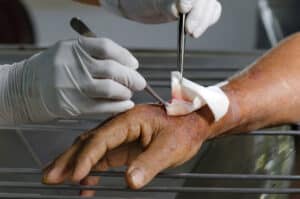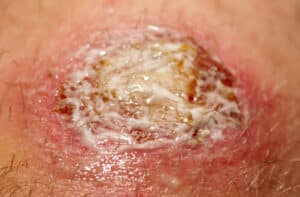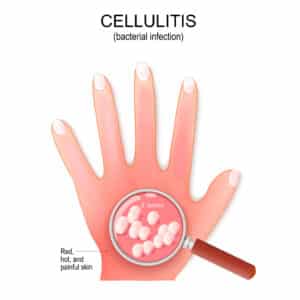Dangerous Symptoms After a Dog Bite
Dog bites are a common injury, especially for children, and normally they don’t lead to any severe problems. However, it is possible for dog bites to turn dangerous, even deadly if an infection sets in. It’s important to watch for these infection symptoms to get appropriate care rapidly.
You should never avoid getting treatment for a dog bite out of fear of cost. Colorado recognizes strict liability of dog owners when their pets bite. The dog owner will pay the full cost of caring for a dog bite to you or your child.
How to Treat a Dog Bite
Performing proper wound care immediately after a dog bite is essential to avoiding dangerous infections later. Follow these steps to head off infection.
Clean the Wound
 For every dog bite, run it under warm water for a few minutes, even if you think the skin wasn’t broken. Cleaning the wound in this way will reveal if the skin was broken, and if the skin was broken, it can help remove the source of potential infection.
For every dog bite, run it under warm water for a few minutes, even if you think the skin wasn’t broken. Cleaning the wound in this way will reveal if the skin was broken, and if the skin was broken, it can help remove the source of potential infection.
Look for any objects in the bite, such as teeth, hair, dirt, or rocks. Remove them with tweezers or by gently brushing with a clean cloth. Don’t apply pressure to a contaminated wound unless you’re trying to counter critical bleeding.
Encourage Bleeding
In a minor wound, encourage bleeding by squeezing around the bite area. If the wound is bleeding freely, let it cover itself with blood, then rinse and repeat a couple times before applying a dressing.
If the wound is bleeding heavily, apply pressure with a clean pad or sterile dressing. Change the saturated dressing and repeat as necessary. Seek immediate attention if the bleeding doesn’t slow after a few dressing changes.
Dry and Cover the Wound
After cleaning and a little bleeding, dry the wound and cover it with a clean dressing. You can apply an antibacterial cream or spray if you have one. Remember what you used in case a doctor or nurse asks.
Take a Painkiller
You can take an over-the-counter painkiller to relieve the discomfort of the bite. Both ibuprofen and acetaminophen are good choices.
Seek Medical Care
Whenever a dog bite attack breaks the skin, you should seek professional medical care. Go to the emergency room if bleeding is severe. Otherwise, urgent care is fine.
They might not opt to do anything if they don’t think the injury is severe, but you should let them evaluate it – trust their professional judgement, not just your sense that the injury “isn’t that bad.”
Remember, the dog owner is responsible for all medical bills, so you should get the care you need, not avoid care out of fear of bills.
Signs of an Infected Dog Bite
 After seeing the doctor, you should be on the lookout for signs of infection. Signs of infection may arise within as few as two hours or they may take up to 14 days to appear.
After seeing the doctor, you should be on the lookout for signs of infection. Signs of infection may arise within as few as two hours or they may take up to 14 days to appear.
Your doctor may have given you a list of things to watch for, but here are some signs that an infection has set in:
- Redness and swelling around the wound
- Slow healing or wounds that seem to grow
- Localized warmth around the wound
- Pus or liquid leaking from the wound
- Sweats and chills
- Fever over 100° F
- Swollen glands: check the neck, the armpits, the groin, and under the chin
- Red streaks stretching from the wound
When you notice any of these symptoms, seek medical attention immediately.
Below are some symptoms to watch for related to specific infections.
Early Rabies Symptoms
Of course, rabies is one of the most worrisome potential complications after dog bite. With good vaccination practices, rabies has become relatively rare among pet dogs, but you should still keep an eye out for it. Rabies symptoms can appear from one to 14 days after a dog bite.
Early symptoms of rabies include:
- Mild fever
- Headaches
- General weakness
- Fatigue or lethargy
Although rare, rabies infections are serious, potentially fatal. If you notice rabies symptoms, seek medical attention immediately.
Early Capnocytophaga Infection Symptoms
Although Capnocytophaga canimorsus is a common bacteria in dog saliva, Capnocytophaga infection isn’t normally a concern for people with healthy immune systems. However, if you’re taking immunosuppressive medications (like those for psoriasis), don’t have a spleen, or drink excessively, your risk can be high.
The infection symptoms can appear from one to 14 days after the bite, most often three to five days. Watch for:
- Blisters around the wound
- Pain, redness and swelling around the wound
- Pus oozing from the wound
- Fever
- Stomach pain
- Vomiting and diarrhea
- Headache or difficulty thinking
- Muscle or joint pain
If you see these symptoms, seek medical attention again.
Early Cellulitis Symptoms
 Cellulitis is an infection often caused by one of several species of Pasteurella bacteria. One of these bacteria is literally called multocida (killer of many), so it’s important to take these infections seriously.
Cellulitis is an infection often caused by one of several species of Pasteurella bacteria. One of these bacteria is literally called multocida (killer of many), so it’s important to take these infections seriously.
These infections typically appear less than 24 hours after a dog bite. Watch for:
- Redness
- Swelling
- Increasing pain around the bite
- Pus oozing from the wound
If not treated properly, these infections can be fatal, and if they aren’t fatal, they can lead to loss of function in the limb or amputation.
Many of these infections are related to inappropriate antibiotic use after a dog bite. We don’t normally recommend second-guessing your doctor, but if you receive a prescription for erythromycin or flucloxacillin after a dog bite, ask for a different one, as Pasteurella are resistant to these.
Early Staph Infection Symptoms
The most common infections after 24 hours are related to Staphylococcus bacteria, commonly known as staph infections. These can take up to 14 days to appear, and manifest with these symptoms:
- Rash around the wound
- Painful red lumps or boils on the skin
- Blisters that ooze fluid
- Honey-colored crust on wound
- Fever
If you see symptoms of this infection, seek immediate medical attention.
Get Compensation for Dog Bite Injuries
If you or a loved one has developed serious complications from a dog bite, you are due compensation from the dog’s owner. Although we understand that you might try to settle the issue informally with the dog owner, in our experience these arrangements typically don’t work. Either the owner will not follow through on their promises or they will start to pay but will later refuse when the bills get large.
Infected dog bites can require extensive care over long periods of time, and few people will pay for them unless compelled to do so. In addition, starting payment with an informal arrangement can make it harder for you to recover damages later. It’s best to talk to a dog bite lawyer right away about your injuries to preserve your rights.
Denver dog bite lawyer Brian Pushchak makes these types of lawsuits a special focus in his practice. He has developed extensive expertise in the area and knows how to ask for and get the compensation you need to pay for all the surgery, prosthetics, and therapy you or your child might need after a serious dog bite.
We utilize our unique Informed Decisions™ Approach that prioritizes getting you the results you need after a dog bite. Mr. Pushchak will listen to your concerns and goals and recommend the best legal strategy to achieve this for you. We provide you with personal contact information, and you can reach us any time you have questions or concerns about your case. Although we will recommend the best strategies, your case remains yours – you are always in control.
To learn how Pushchak Law can help you get compensation for your dog bite injuries, please contact us today for a free consultation. We serve clients in Denver and the surrounding areas of Colorado.
- Dog Bite Prevention Tips for Children - May 29, 2025
- How to Improve Motorcycle Visibility to Other Drivers - May 16, 2025
- How to Gather Evidence After a Motorcycle Accident - May 9, 2025
Free Case Consultation
If you have been injured and would like to speak with one of our attorneys, take advantage of our free, no-obligation consultation. And if you have a viable case, there are no fees until we win.
Call 303.372.6145


